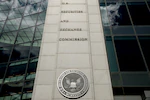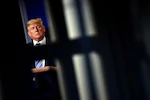The turnaround follows a volatile session that sent markets plunging after the Senate twice failed to advance the coronavirus stimulus bill.
Late Monday night, Senate leadership and the Trump administration came closer to an agreement after a day of fiery exchanges on the Senate floor. As negotiations wrapped up just before midnight, Senate Minority Leader Charles E. Schumer (D-N.Y.) and Treasury Secretary Steven Mnuchin signaled that an agreement could come as soon as Tuesday morning.
Though some details are in flux, the legislation would provide direct payments of $1,200 to many American adults and another $500 for children. It would also create roughly $850 billion in loan and assistance programs for businesses, states and cities and increase spending for the unemployment insurance program, as well as hospitals and health-care providers.
Earlier Monday, the Fed launched an unprecedented effort to keep money flowing to companies, households and cities by buying unlimited amounts of U.S. Treasurys and mortgage-backed securities. The response goes far beyond any the central bank took during the 2008 financial crisis and comes as more businesses shutter by the day and on the expectation that millions of people will lose their jobs.
“We’ve already seen the Federal Reserve throw the kitchen sink at this crisis and now investors are looking to Congress and weighing the impact of this imminent rescue package,” said Nicole Tanenbaum, chief investment strategist at Chequers Financial Management. “Once a stimulus deal is reached, while it won’t be the silver bullet to curb the virus outbreak, it will provide some much needed clarity and what an ultimate path to economic recovery may look like.”
The Fed announcement caused a brief spike in the markets Monday, then investors returned their focus to Capitol Hill. The Senate twice failed to advance the stimulus bill, pushing the Dow nearly 600 points lower, or 3 percent, to close at 18,591. The S&P 500 dropped roughly 3 percent and the Nasdaq tipped down 0.3 percent.
A worldwide turnaround also was afoot Tuesday, buoyed in part by stimulus hopes in the United States. In Europe, Britain’s FTSE 100 climbed 4.9 percent, and Germany’s DAX 7.1 percent. The benchmark Stoxx 600 rose 5.56 percent.
In Asia, Japan’s Nikkei 225 surged 7.1 percent, and Hong Kong’s Hang Seng 4.46 percent.
March 24, 2020 at 10:14 AM EDT
SEC warns of insider trading risks amid outbreak
The Securities and Exchange Commission is warning of the risk of insider trading.
The coronavirus has affected U.S. markets in “unprecedented” ways, Stephanie Avakian and Steven Peikin, co-directors of the SEC’s Division of Enforcement, said in a sharply worded statement released late Monday. Given those “dynamic circumstances, corporate insiders are regularly learning new material nonpublic information that may hold an even greater value than under normal circumstances,” the statement said.
In early March, the SEC temporarily lifted some requirements that publicly traded companies periodically alert shareholders to their financial health and quickly disclose significant corporate changes that could affect the stock price. Companies that can show they need extra time will be granted a reprieve for documents that should have been filed from March 1 to April 30, the SEC said.
But “given these unique circumstances, a greater number of people may have access to material nonpublic information than in less challenging times,” Avakian and Peikin said. The agency delivered its warning a week after stock sales by several lawmakers, including Senate Intelligence Committee Chairman Richard Burr (R-N.C.), raised questions about whether they were influenced by private briefings on the outbreak that later led to a historic plunge in U.S. equity markets.
By Renae Merle
March 24, 2020 at 9:53 AM EDT
Analysis: Wall Street to Trump: Don’t restart economy before stopping coronavirus spread
President Trump is considering whether to bring the economy out of its government-induced coma, insisting the pain of the restrictions should not outweigh that from the coronavirus itself.
But investors, portfolio managers and economists with a front-row seat to the ongoing carnage on Wall Street and beyond aren’t so sure that scaling back social distancing is the right move. Many say the economy — and still-sliding stock market along with it — won’t begin to recover until the United States definitively turns the tide against the disease.
“You may get a [market] bounce on the headline,” Quincy Krosby, chief market strategist at Prudential Financial Inc., said. “Or the market could down even more if the community of investors and traders believe this is the opposite of what is needed. Above all else it will be the empirical data that suggests the virus is receding.”
Adam Sarhan, CEO of investment firm 50 Park Investments, says the market will only stop plumbing new lows once new infections level off. “What the world, and the market, needs to see is that number stop going up,” he says. “Think of it as a trade: What’s the risk of reopening early?” Sarhan said. “The risk is the number of cases continues to skyrocket, and longer term, you’re just digging a much deeper hole.”
Top public health officials warn that prematurely lifting measures aimed at separating people to slow transmission of the virus could allow it to surge, which would overwhelm the medical system, prolong the crisis and deepen the toll on human life and the economy.
By Tory Newmyer



